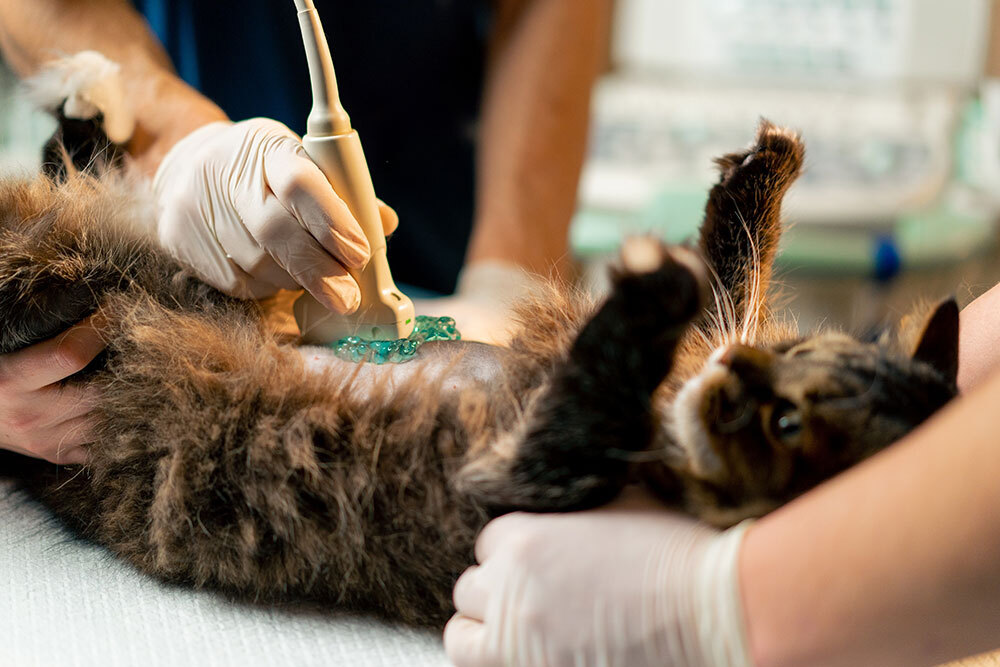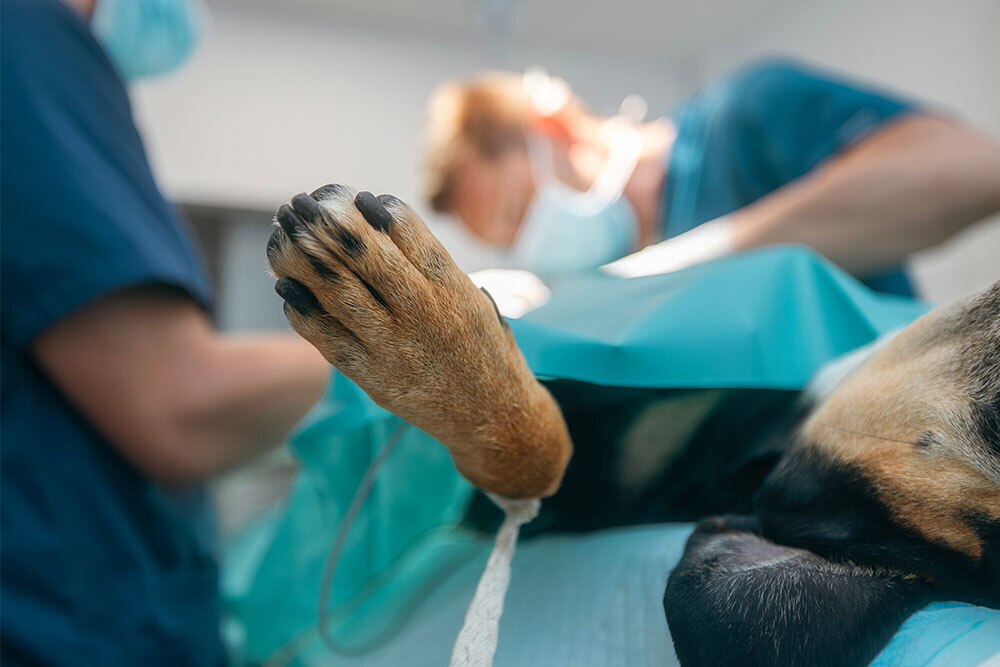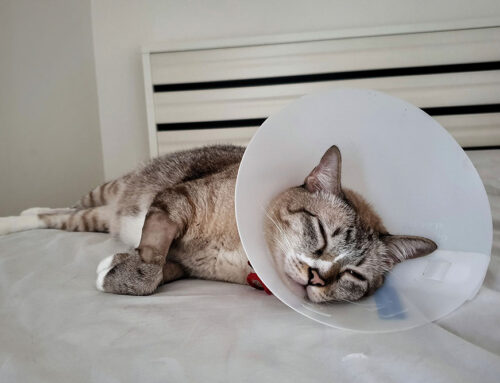Pyometra Explained: Symptoms, Surgery, and Prevention for Dogs and Cats
When a pet feels tired or skips a meal, it’s easy to assume it’s something minor- and often, it is. Many families think of a day of indigestion or the after-effects of hot weather. But for an unspayed female dog or cat, vague signs like fatigue, vomiting, or a swollen belly can signal something far more serious: pyometra, a uterine infection that can quickly become life-threatening.
At Oliver Animal Hospital, we often remind families that pets don’t always show clear signs when something is dangerously wrong. Pyometra is one of those conditions where quick action can mean the difference between recovery and tragedy. Understanding what it is, how it progresses, and why emergency surgery is the only true cure can help you save your dog or cat’s life.
What Is Pyometra?
Pyometra is an infection of the uterus that develops in unspayed females, usually in middle-aged to older adults. The condition occurs after repeated heat cycles, when hormonal changes make the uterine lining thick and prone to bacterial infection.
There are two main types:
- Open pyometra: The cervix remains open, allowing pus to drain. Owners may notice foul-smelling discharge from the vagina. While this may look alarming, it at least signals that infection is escaping. An open pyometra may become closed, increasing risks for your pet.
- Closed pyometra: The cervix is sealed, trapping pus inside. The uterus swells, toxins enter the bloodstream, and the pet’s condition can deteriorate rapidly. With no discharge visible, the danger may be harder to recognize until the animal is gravely ill.
Both forms are medical emergencies, but closed pyometra is especially deadly because signs can remain hidden until the infection overwhelms the body.
Cats are at risk as well. Although less common than in dogs, pyometra in cats can progress just as quickly. Because cats are often more subtle in showing signs of illness, owners may not realize the severity until the infection is advanced.
In rare cases, a condition called stump pyometra can occur even in spayed pets if a small piece of uterine or ovarian tissue remains. This tissue can still respond to hormones and become infected, leading to the same dangerous symptoms. Treatment requires surgery to remove the infected tissue.
Recognizing the Symptoms of Pyometra
Pyometra doesn’t always announce itself loudly. The earliest signs are often mistaken for general illness:
- Lethargy or unusual tiredness
- Decreased or absent appetite
- Increased thirst and urination (dogs more commonly than cats)
- Vomiting or diarrhea
- Fever or shivering
- Abdominal swelling
- Vaginal discharge (with open pyometra)
In cats, symptoms may be even more subtle. Owners sometimes notice hiding, decreased grooming, or vague abdominal discomfort.
Because these signs overlap with many other conditions, families sometimes wait to “see if it passes.” Unfortunately, with pyometra, waiting can be the most dangerous decision of all.
If your unspayed dog or cat seems unwell, especially after a heat cycle, it’s critical to act quickly. The same applies if a spayed pet suddenly shows these symptoms, since stump pyometra is still possible.
Why Pyometra Is Always an Emergency
Pyometra is not an infection that improves with rest or fluids. It progresses rapidly, often within days, and can lead to:
- Septicemia: Infection spreading into the bloodstream
- Kidney failure: Toxins overwhelm the kidneys’ filtering ability
- Uterine rupture: A swollen uterus can burst, releasing infection into the abdominal cavity
- Multi-organ failure: Without treatment, death can occur quickly
AAHA reminds pet owners that certain conditions, including pyometra, require immediate care. This is not a “wait until morning” scenario.
The same urgency applies to stump pyometra. Even though the uterus has already been removed, infected tissue remnants can rupture or spread toxins just as rapidly as a full pyometra.
Why Surgery Is the Only Cure
Families sometimes ask whether antibiotics alone can treat pyometra. The short answer is no.
- In open pyometra, antibiotics may temporarily reduce bacterial load, but infection will return.
- In closed pyometra, antibiotics cannot penetrate the sealed uterus, and the pet’s condition often worsens even with aggressive medical therapy.
- In stump pyometra, antibiotics may ease signs briefly, but infected tissue will remain until surgically removed.
The only cure is emergency ovariohysterectomy, surgical removal of the uterus and ovaries- or in the case of stump pyometra, surgical removal of the infected tissue. Unlike a routine spay, these surgeries are more complex. The tissue is enlarged, fragile, and infected, and the patient is often unstable from systemic illness.
Successful treatment depends not only on surgical skill but also on supportive care:
- Pre-anesthetic bloodwork to evaluate organ function and identify risks
- IV fluids to maintain hydration and blood pressure
- Antibiotics and pain control
- Advanced monitoring during and after surgery
At Oliver Animal Hospital, we are equipped to provide this level of urgent care during normal business hours and can help coordinate emergency referrals after hours if needed. Many pets don’t need hospitalization if the pyometra is caught early and surgery goes smoothly. If your pet isn’t seen promptly, or surgery is delayed, then complications are practically guaranteed. This means longer hospital stays, potential for life-threatening problems, and more expensive bills.
What Happens If Surgery Is Delayed?
Delaying surgery can lead to heartbreaking complications:
- A closed pyometra may rupture, flooding the abdomen with pus and drastically lowering survival chances.
- Kidneys can fail under the toxin load.
- Sepsis can progress to shock, making anesthesia riskier and surgery less likely to succeed.
- A stump pyometra may rupture or continue to worsen until infected tissue is removed.
Even in cases where antibiotics seem to help for a few days, the infection remains. Without surgery, pyometra will always return, and the second episode may be even more severe.
Prompt surgical treatment offers the best outcome and the highest survival rate.
Prevention: Why Spaying Matters
The most effective way to protect your dog or cat from pyometra is to spay her before the condition develops. Spaying eliminates the uterus and ovaries, removing the risk of infection.
The benefits don’t end there:
- Spaying also prevents ovarian cancer and dramatically lowers the risk of mammary cancer.
- According to the ASPCA, spayed pets often live longer, healthier lives.
- AAHA life stage guidelines recommend discussing spay timing with your veterinarian based on age, breed, and health.
At Oliver Animal Hospital, our spay and neuter services are performed with advanced monitoring and compassionate care to give your pet the safest possible experience. High-quality surgical technique also helps prevent rare complications like stump pyometra.
Caring for a Pet After Pyometra Surgery
Recovery from pyometra surgery is more involved than from a routine spay. Pets need rest, medication, and close monitoring for complications.
- An Elizabethan collar is essential to prevent licking at the incision site. Here’s how to make it more comfortable.
- Follow-up visits help ensure healing is on track.
- Most dogs and cats recover well and return to normal life within a few weeks, but owner vigilance is key.
Pets who undergo surgery for stump pyometra typically recover well once the infected tissue is removed, but careful monitoring is still necessary.
When to Call the Vet
If your unspayed female dog or cat shows any of the following, call immediately:
- Lethargy, fever, or refusal to eat
- Vomiting or increased thirst/urination
- Abdominal swelling or discomfort
- Vaginal discharge, especially after a heat cycle
Even if your pet is spayed, call us if she shows these symptoms. Pyometra moves quickly. The sooner treatment begins, the better the chances for recovery.
You can reach Oliver Animal Hospital at (512) 892-1000 during normal business hours for emergencies or contact us here. If your pet is showing red-flag symptoms, don’t wait. Same-day urgent appointments are often available.
Quick Action Saves Lives
Pyometra is a heartbreaking condition because it is both dangerous and preventable. Surgery is the only cure once infection sets in, and delaying care puts your pet’s life at risk. But with rapid veterinary intervention, most dogs and cats make a full recovery.
At Oliver Animal Hospital, we believe every pet deserves world-class medical care, whether it’s preventive wellness, urgent treatment, or supportive guidance through difficult decisions. If you’ve noticed troubling changes in your unspayed or spayed female pet, please request an appointment today or call us right away. Acting quickly may save her life.








Leave A Comment